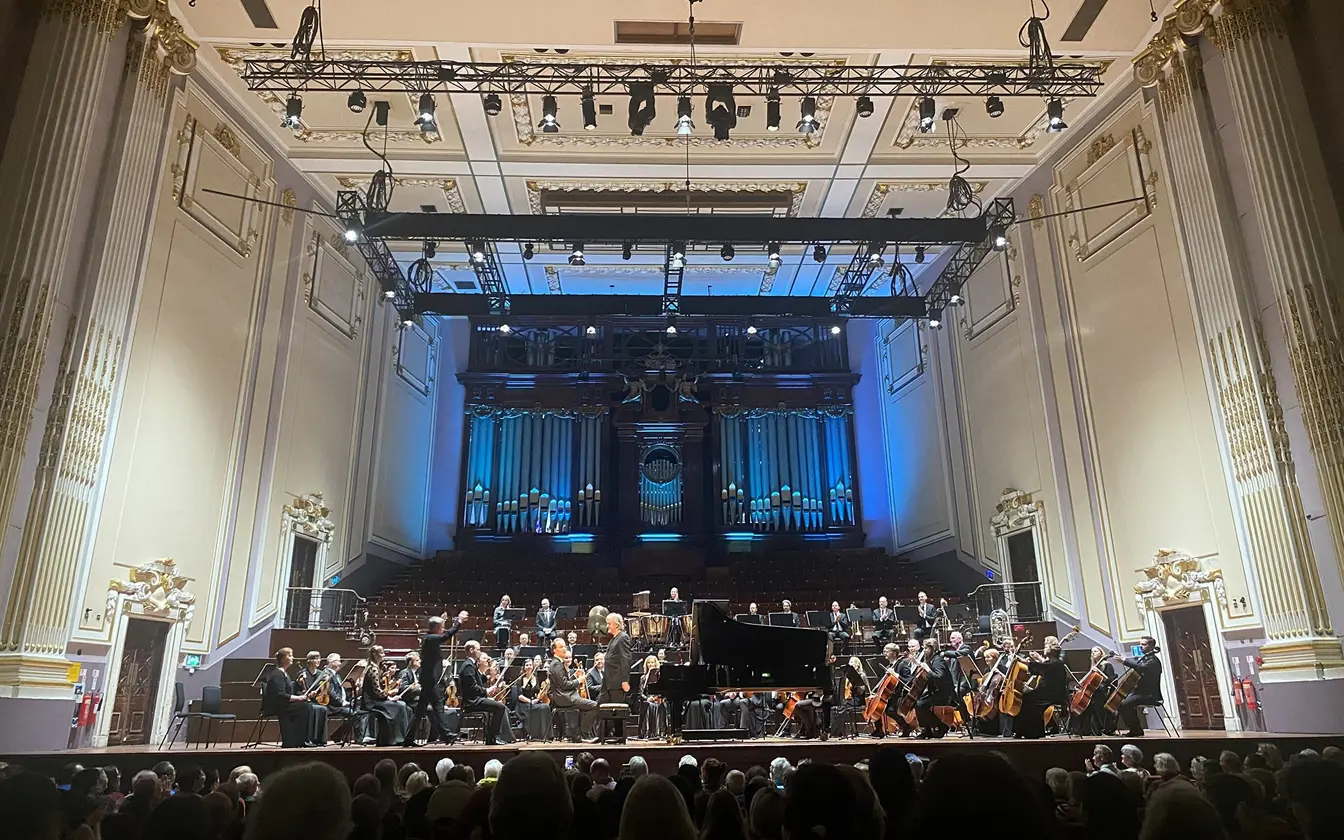Perth Festival: Estonian National Symphony Orchestra

Donal Hurley, Edinburgh Music Review
As part of this year’s (50th Anniversary) Perth Festival of the Arts, the warm acoustic of Perth Concert Hall played host to the Estonian National Symphony Orchestra on the night of Saturday 20th May, under the baton of their compatriot and Music Director Olari Elts and featuring Northern Irish pianist Barry Douglas as soloist in Rachmaninoff’s most popular concerto, his Second. The programme opened with Estonian composer Arvo Pärt’s ‘Cantus in Memoriam Benjamin Britten’ and concluded with Dvořák’s Symphony No.7.
Pärt’s music often exemplifies profundity through simplicity and the elegiac ‘Cantus’ is a perfect example of this. Scored for strings and a single tubular bell, it starts with three soft taps on the bell. Then starting with the first violins playing very softly at the top of their register, the parts enter one by one playing portions of a descending A-minor scale out of sync, increasing in volume, punctuated by the bell tolling periodically, also increasing in loudness. Each part in turn eventually arrives at a note in the A-minor triad on which it settles and the strings stop playing abruptly when all have resolved into the chord. The reverberation of the last toll of the bell die away, concluding the piece. I first heard the ‘Cantus’ live from the RSNO under Marin Alsop in the noughties and it made a profound impression on me then. The swelling dynamic evokes the mounting sensation of grief and loss, while the gentle rocking of the descending scale is comforting and consoling. A cathartic and palate-cleansing concert-opener, it was beautifully performed and the Perth audience was evidently moved and awarded the performers the evening’s first seal of unalloyed approval.
The winds, brass and timpanist joined the strings on stage and tuned afresh – even tuning, the ensemble sound was rich and warm. There was a brief expectant hush before maestro Elts and Barry Douglas arrived on stage to an enthusiastic Perth welcome. The famous solo piano intro chord progression sounded fresh and the romantic first theme was underway on strings. From the off, the close partnership of soloist, conductor and orchestra was evident. The tempo was a tad slower than customary, but as the movement unfolded it became clear that this left room for elegant mutually responsive phrasing and a clearer sense of light and shade. Barry Douglas’ articulation was as flawless as ever. The climax of the movement, where the piano plays a rhythmic counter-melody from the development over a passionate re-statement of the first theme, was as dramatic as I have heard. Shimmering muted strings introduce the slow movement, the piano enters with a triplet accompaniment and principal clarinet introduces the wistful melody in the major key: Soo-Young Lee did this beautifully. The mood and tempo shift slightly to a more anxious central section in the minor key, leading to a cadenza, which was quite magnificent. The movement ends with a nod to Tchaikovsky whose spirit is never far from the surface in this concerto. The finale, played attacca as always, was brilliant from start to finish, the rhythmic interplay between orchestra and soloist in the faster parts was precise while sounding free, again evidencing the closeness of the rapport in the partnership on stage. The romantic ‘Big Tune’ was as impassioned as I’ve ever heard it. Overall, this was a moving and thrilling performance that made a workhorse of the repertoire sound fresh and new. Quite superb. The Perth audience evidently agreed – the applause was tumultuous. Barry gave us a final nod to the spirit of Tchaikovsky as an encore: ‘October’ from ‘The Seasons’ of the senior master. No less superb.
As with so many other groups of similar works from a composer’s oeuvre, I always feel about Dvořák’s last three symphonies that my favourite is whichever I have heard most recently. All three have a special place in my heart, for entirely different reasons. The Seventh, of all of the canon of 9, is the most overtly Brahmsian, yet approaching it is if it were a Brahms symphony is, I feel, a travesty committed by far too many conductors, including many of the most eminent. Homage is not mimicry; the Seventh is pure Dvořák. I have long thirsted for an interpretation that linked Dvořák’s Seventh to other symphonies in D minor. That is what maestro Elts revealed to the rapt Perth audience – a work whose outward gravitas and austerity conceals an emotional intensity and a poetic beauty. The experience was unforgettable. The playing had a directness, immediacy and unity of vision that was captivating. The first movement fully exploited the dramatic tension, especially in the più mosso sections, but never at the expense of the harmonic beauty. A similar approach held the attention throughout the slow movement, careful attention to dynamic balance preserving the harmonic beauty through shifting shades of wistful melancholy and cathartic release. The lilting bucolic scherzo, one of Dvořák’s loveliest Furiants, was delicious. The embattled glowering finale, relentlessly in the minor key until the final triumphant Tierce de Picardie was thrillingly expressive.
The almost entirely youthful Estonian orchestra delivered a performance that was as truly memorable as it was engaging. The appreciative Perth audience knew they had experienced something particularly special and their rapturous applause was rewarded with two encores: an orchestral arrangement of a wistful, melancholy Sibelius song and an arrangement of an ethnic South Estonian folk dance, suggestive of similar Hungarian dances by Kodály. Equally thrilling and unforgettable.